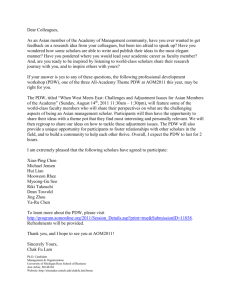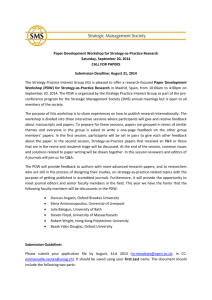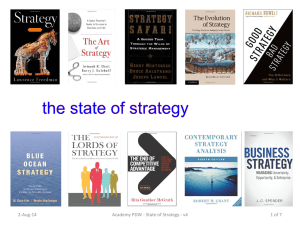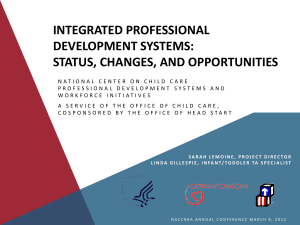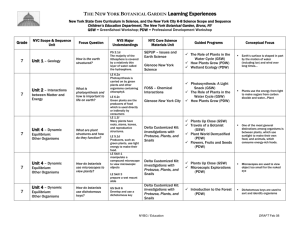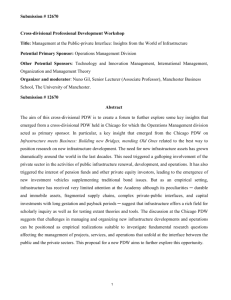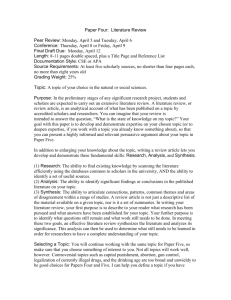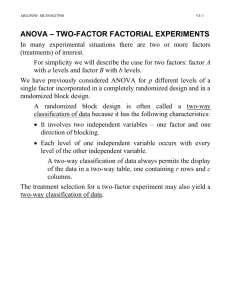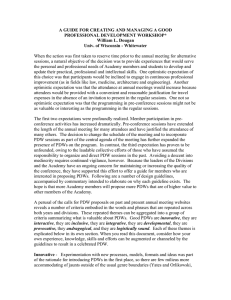PDW programme - Manchester Business School
advertisement
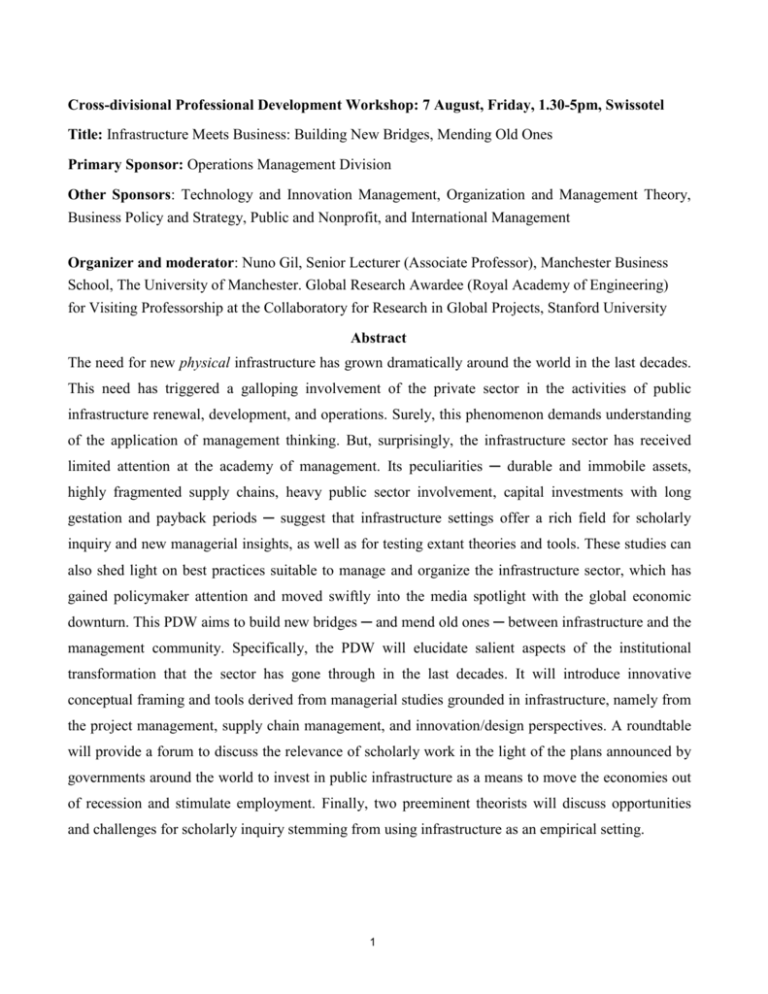
Cross-divisional Professional Development Workshop: 7 August, Friday, 1.30-5pm, Swissotel Title: Infrastructure Meets Business: Building New Bridges, Mending Old Ones Primary Sponsor: Operations Management Division Other Sponsors: Technology and Innovation Management, Organization and Management Theory, Business Policy and Strategy, Public and Nonprofit, and International Management Organizer and moderator: Nuno Gil, Senior Lecturer (Associate Professor), Manchester Business School, The University of Manchester. Global Research Awardee (Royal Academy of Engineering) for Visiting Professorship at the Collaboratory for Research in Global Projects, Stanford University Abstract The need for new physical infrastructure has grown dramatically around the world in the last decades. This need has triggered a galloping involvement of the private sector in the activities of public infrastructure renewal, development, and operations. Surely, this phenomenon demands understanding of the application of management thinking. But, surprisingly, the infrastructure sector has received limited attention at the academy of management. Its peculiarities ─ durable and immobile assets, highly fragmented supply chains, heavy public sector involvement, capital investments with long gestation and payback periods ─ suggest that infrastructure settings offer a rich field for scholarly inquiry and new managerial insights, as well as for testing extant theories and tools. These studies can also shed light on best practices suitable to manage and organize the infrastructure sector, which has gained policymaker attention and moved swiftly into the media spotlight with the global economic downturn. This PDW aims to build new bridges ─ and mend old ones ─ between infrastructure and the management community. Specifically, the PDW will elucidate salient aspects of the institutional transformation that the sector has gone through in the last decades. It will introduce innovative conceptual framing and tools derived from managerial studies grounded in infrastructure, namely from the project management, supply chain management, and innovation/design perspectives. A roundtable will provide a forum to discuss the relevance of scholarly work in the light of the plans announced by governments around the world to invest in public infrastructure as a means to move the economies out of recession and stimulate employment. Finally, two preeminent theorists will discuss opportunities and challenges for scholarly inquiry stemming from using infrastructure as an empirical setting. 1 Overview of the Workshop Background: The spending required to update physical infrastructure in developed countries and to develop appropriate infrastructure in emerging economies is estimated at a staggering $53 trillion between 2007 and 2030 in a report from the Organization for Economic Cooperation and Development; OECD also exhorts developed nations to invest at least 2.5% of their GDP in infrastructure (OECD 2007). Broadly defined, infrastructure includes transportation systems, utility networks, resource extraction facilities, and social assets. These are key components of the large socio-technological systems such as water supply or air travel (Hughes 1987), which deliver services central to the continuance and growth of every community and state. Ensuring that everyone has access to these services at affordable costs protects equity and public welfare. Sporadically, deadly events, such as the collapse of Bridge 9340 over the Mississippi river and Hurricane Katrina striking New Orleans, offer stark reminders of the dangers of damaged or failing infrastructure. They also highlight the essential role that infrastructure plays in keeping people and businesses safe and protected against the forces of nature. More recently, governments around the world have pledged to invest massively in infrastructure renewal and development in the face of the global economic downturn, borrowing from Keynes’ theory that government spending in infrastructure can help to stimulate more production and investment. This strategic approach to increase the economic activity, remove the threat of deflation, and increase employment rates appears to have been readily embraced both by developed economies like the US, European Union, and UK, as well as by developing economies like China and India. The involvement of private-sector capital in infrastructure is also galloping. Just from 2000 to 2006, infrastructure transactions rose from $52 billion to about $145 billion, and demand for new deals rose faster than supply (Saigol 2006). Further, almost $1 trillion of assets have been sold around the world since the 1980s (OECD 2007). As a result, the activities to design, develop, operate, and manage 2 infrastructure have become a large segment of business, including both suppliers of engineering, manufacturing, and construction, as well as investors, developers, and owners of the assets. Given these developments, this PDW aims to build new bridges ─ as well as mend old ones ─ between infrastructure and the management community. Surely, the renewal, development, and operations of infrastructure demand understanding of the application of management thinking ─ particularly so as governments worldwide increasingly recourse to privatization and private finance to bridge the infrastructure gap. But, surprisingly, infrastructure has received limited attention at the academy of management even if research on the interplay among regulation, politics and economics of infrastructure has a long empirical and analytical tradition.1 As an empirical research setting, the infrastructure sector exhibits a number of peculiarities: it deals with durable and immobile assets; it sources from the highly fragmented engineering and construction supply chains; it entails heavy public sector involvement; and it repeatedly makes capital investments with long gestation and payback periods, which are vulnerable to changes in policy, technology, and customer requirements. These peculiarities suggest that infrastructure offers a rich field for scholarly inquiry and yielding new managerial insights, as well as for testing extant conceptual framing and tools in different settings and under different conditions (Gil and Beckman 2009). These studies can shed light on best practices suitable to manage the infrastructure sector, which has swiftly gained policymaker attention with the global economic downturn. These best practices, we conjecture, are likely to apply to many other production activities, particularly those that involve complex institutional contexts. Noteworthy, this proposal builds upon a cross-divisional PDW that Nuno Gil organized two years ago in Atlanta, entitled “The Management of Large Engineering Projects: Debating a Research 1 Departments of Civil Engineering and Environment have welcomed, historically, small groups of scholars interested in construction, engineering, and project management, but they and business schools have remained disparate 3 Agenda.” That 2-hour PDW, which brought together presentations from professors from the US, Australia, and Europe in front of a packed room, de facto planted the seed for this PDW. Some of the contributors in 2007 will return in 2009, namely MIT Professor Donald Lessard and MBS Professor Graham Winch. This new PDW will provide an exciting opportunity to stay abreast of developments in their own thinking on the management of complex projects. Furthermore, between 2007 and 08, Nuno Gil co-edited a special issue of California Management Review (published in February 2009) on Infrastructure meets Business. Some speakers who will participate in this PDW contributed original articles, and will reflect on the relevance of their thinking to practice in the infrastructure sector. Objectives: The PDW will create a locus for discussing recent contributions derived from management studies grounded in infrastructure settings. The PDW will enable to, first, play the socio-politico-economic developments in the infrastructure sector against conceptual framing and tools in the management arena. And second, to debate the relevance of scholarly work grounded in infrastructure to practice and theory. Specifically, the objectives are: Discuss the relevance of salient institutional characteristics of the infrastructure sector to the application of management thinking. Discuss the relevance of advances in the theories of project management, supply chain management, and innovation and design to practice in the infrastructure sector Discuss opportunities and challenges faced by scholars interested in adopting the infrastructure context as an empirical setting for rigorous studies in management and organization. communities apart from notable exceptions. Recent developments call for more synergy and complementarity, I argue. 4 Why the workshop should be of interest to the Operations Management Community: As an empirical setting, the infrastructure sector offers exciting opportunities for scholars interested in operations management, particularly in the areas of project management, supply chain management, and design/new product development. This PDW will help operation management scholars gain awareness of, first, the implications for research and practice stemming from the institutional setting wrapping new infrastructure developments; and second, recent scholarly contributions in the areas of project management, supply chain management, and design/innovation grounded in infrastructure settings. Specifically, scholars will gain understanding of, and will have opportunity to discuss: 1) the reasons behind the increasing involvement of the private-sector capital in public infrastructure development, and what the impacts of this phenomenon are; 2) the challenges to rapidly deliver technically complex infrastructure projects under conditions of high uncertainty and ambiguity; 3) the applicability of relational contracts and lean thinking to create innovative framings for managing the highly-fragmented engineering and construction project-based supply chains; 4) the applicability of innovative notions like design modularity, safeguarding, and systems integrators to new infrastructure design and development Further, the PDW will create opportunities to engage operation management scholars in a broader discussion as a preeminent theorist agreed to set off a debate on the challenges and opportunities that rigorous infrastructure-grounded research poses to management and organization scholars. Why the workshop should be of interest to the Committees in Technology and Innovation Management, Organization and Management Theory, Business Policy and Strategy, Public and Nonprofit, and International Management? The overview of the workshop and the background information provided above sheds light on a number of connections that make the proposed discussions and debates relevant for the communities grouped under the umbrella of these committees. I would highlight the following aspects: 5 First, issues around infrastructure design and product development overlap with the interests of the community of technology and innovation management researchers. Infrastructure often involves low and medium technology sectors. Sectors like construction, transportation, and manufacturing are important users of technological innovations developed by firms in the high-tech sectors. Thus, infrastructure plays a critical role in the growth of the high-tech sectors. Second, the debate that Professor Carliss Baldwin from Harvard will set off on the challenges and opportunities that management and organization scholars face in adopting the infrastructure sector as an empirical setting will be highly relevant for the Organization and Management theory community. Third, the increasing involvement of the private sector in public infrastructure development is a phenomenon that will be of much interest to scholars interested in business policy and management, as well as in the management of public and nonprofit activities. Fourth, the roundtable around the relevance of infrastructure-grounded scholarly management contributions to the decisions of governments to recourse to infrastructure investment to stimulate economies and boost employment will matter to scholars interested in international management. Here, I would highlight the participation of Donald Lessard, Professor of International Management, Global Economics and Management at the MIT Sloan School of Management. Structure of the PDW: This 3 1/2-hour PDW will include the following four phases: Phase 1: (15 minutes) a. General Welcome b. Session organiser introduces the ethos underpinning the PDW, elucidates the infrastructure gap, and highlights institutional aspects of the infrastructure sector relevant for management studies. c. Session organiser provides an overview of the structure of the PDW, previewing the schedule of activities for the afternoon, and introducing the speakers Phase 2: (70 minutes): Debate on Institutional Developments and Industry Response This session aims to build common ground for the two subsequent phases. The aim is to engage speakers and audience in a debate around two major issues: First, the alternative strategic approaches that can help to bridge the existing infrastructure gap; and second, the industry responses to the 6 increasing involvement of private-sector capital in public infrastructure. To anchor and stimulate the debate, four speakers agreed to deliver brief presentations: a) Young Kwak, Associate Professor of Project Management, The George Washington University Building upon a comprehensive literature review and intimate knowledge of strategic thinking at the World Bank (Kwak et al. 2009), Young will highlight recommendations to the public sector and private enterprise interested in forming public-private partnerships for new infrastructure development. b) Jochen Markard/ Hagen Worch, Cirus - Innovation Research in Utility Sectors, Swiss Federal Institute of Aquatic Science and Technology, Switzerland Building upon fieldwork in the public sector world in Switzerland (Dominguez et al. 2009), the presenters will argue that public utilities that adopt strategic planning methods can close the capability gap, thereby offering a viable alternative to private sector involvement in infrastructure operations. c) Dennis Lorenzin, Head of Global Project Management, Nokia-Siemens Networks. NSN is one of the largest suppliers of mobile and fixed network infrastructure solutions in the world, with operations in 150 countries, and combined pro-forma revenues of about 17.1 billion Euro in fiscal year 2006. Dennis will summarize how the Lean Network Implementation – LeaNI programme, and particularly the Integrated Project Management (IPM) model, is enabling NSN to remain competitive in an increasingly competitive business environment. d) Glenn Ballard, Research Director, Lean Construction Institute; Director, Project Production Systems Laboratory, University of California at Berkeley. Glenn will showcase pioneering work in structuring the project design phase for innovation. The insights will be derived from fieldwork on the California Prison Receivership project, a $6 billion program to provide 10,000 beds in 7 different locations within three years. A relational contract form – the Consensus Docs forms – is being used to frame the supply chain relationships in the project. Coffee break – 20 minutes Phase 3: (70 minutes): Roundtable on relevance of theory in the face of infrastructure investment plans This session will provide a roundtable discussion on the relevance of recent scholarly work in the fields of project management, supply chain management, and design/innovation to the pledges made by governments worldwide to invest in infrastructure. To anchor and stimulate the debate, four speakers have agreed to deliver brief presentations. a) Donald Lessard, Epoch Foundation Professor of International Management, Global Economics and Management (GEM), MIT Sloan School of Management Donald will reflect on the relevance of his work on new conceptual framing appropriate for managing (in the face of) risk and uncertainty in large complex projects. He will draw from his experience as faculty director of the BP Projects and Engineering Academy, a major executive education program for major project leaders that spans management and engineering b) Dan Lovallo, Professor at The University of Sydney, and former strategy specialist at McKinsey & Co. 7 Dan Lovallo will shed light on the relevance of the notions of delusion and deception to initiatives to develop mega infrastructure projects. He will discuss how accountability, transparency, and best practices such as reference class forecasting can overcome strategic misrepresentation. He will build upon work on decision-making with Bent Flyvbjerg and Nobel laureate Daniel Kahneman (Lovallo et al. 2009). c) Graham Winch, Professor of Project Management, Manchester Business School, The University of Manchester Graham will reflect on the relevance of a new model of the escalation process developed from the identification of the complementarities between three distinctive contributions that have attempted to address major projects with theoretical sophistication - strategic misrepresentation, escalation of commitment, and future-perfect thinking. d) Andrew Davies, Reader in the Innovation and Entrepreneurship Group, Imperial College Business School, UK Andrew will argue how the notion of systems integrators - organizations responsible for establishing a project governance structure, collating customer requirements, managing risks, and coordinating the supply chain - can be appropriated by both infrastructure promoters and constructors to successfully create product and process innovations in mega projects. He will build upon his fieldwork on the Terminal 5 project to expand the Heathrow airport, London (Davies et al. f2009). Phase 4: (35 minutes): Challenges and opportunities that physical infrastructure as an empirical setting brings to the Academy of Management Carliss Baldwin and Michael Jacobides, two preeminent theorists based respectively in the US and Europe, have accepted the invitation to set off a final reflection about opportunities and challenges that the (physical) infrastructure sector brings to the academy of management. a) Carliss Baldwin, William L. White Professor of Business Administration at the Harvard Business School. Carliss is a member of the Visiting Committee of the Harvard Graduate School of Design. With Kim B. Clark, Carliss is involved in a multi-year project to study the process of design and its impact on the structure of the computer industry. b) Michael Jacobides, Associate Professor of Strategic and International Management, London Business School, and Sumantra Ghoshal Fellow, Advanced Institute of Management Research. Michael’s main research interests are in understanding firms´ scope, industry and value chain evolution (in particular, vertical scope), profit migration and rent distribution, and on how Information and Technology is changing all the above. References Davies, A., Gann, D., and Douglas, T. (2009). “Innovation in Megaprojects: Systems Integration at London Heathrow Terminal 5.” California Management Review. Winter. Dominguez, D., Worch, H., Markard, J., Truffer, B., and Gujer, W. (2009).“Closing the Capability Gap: Strategic Planning for the Infrastructure Sector” California Management Review. Winter. Flyvbjerg, B., Massimo Garbuio, M., and Dan Lovallo, D. (2009). “Delusion and Deception in Large 8 Infrastructure Projects. Two Models for Explaining and Preventing Executive Disaster“ California Management Review. Winter. Gil, N. and Beckman, S. (2009). “Infrastructure meets Business: Building New Bridges,. Mending Old Ones.” California Management Review. Winter. Hughes, T. P. (1987) ‘The Evolution of Large Technological Systems’. In Bijker, W. Hughes, T. and Pinch, T. ed(s). The Social Construction of Technological Systems. Cambridge: MIT Press. Kwak, Y., Chih, Y, Ibbs, C.W. (2009). “Infrastructure Privatization: History, Schemes, Obstacles, and Opportunities.” California Management Review. Winter. OECD (2007). Infrastructure to 2030. Mapping Policy for Electricity, Water and Transport. Vol. 2, Organization for Economic Co-operation and Development. Saigol, L. (2006). “Infrastructure Deals Soar to $145 bn,” Financial Times, October 13. 9
